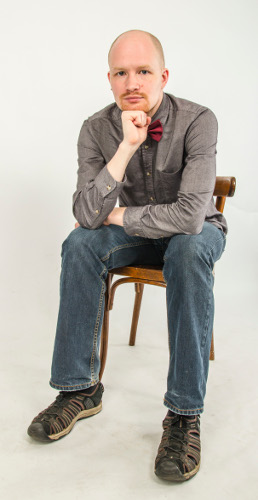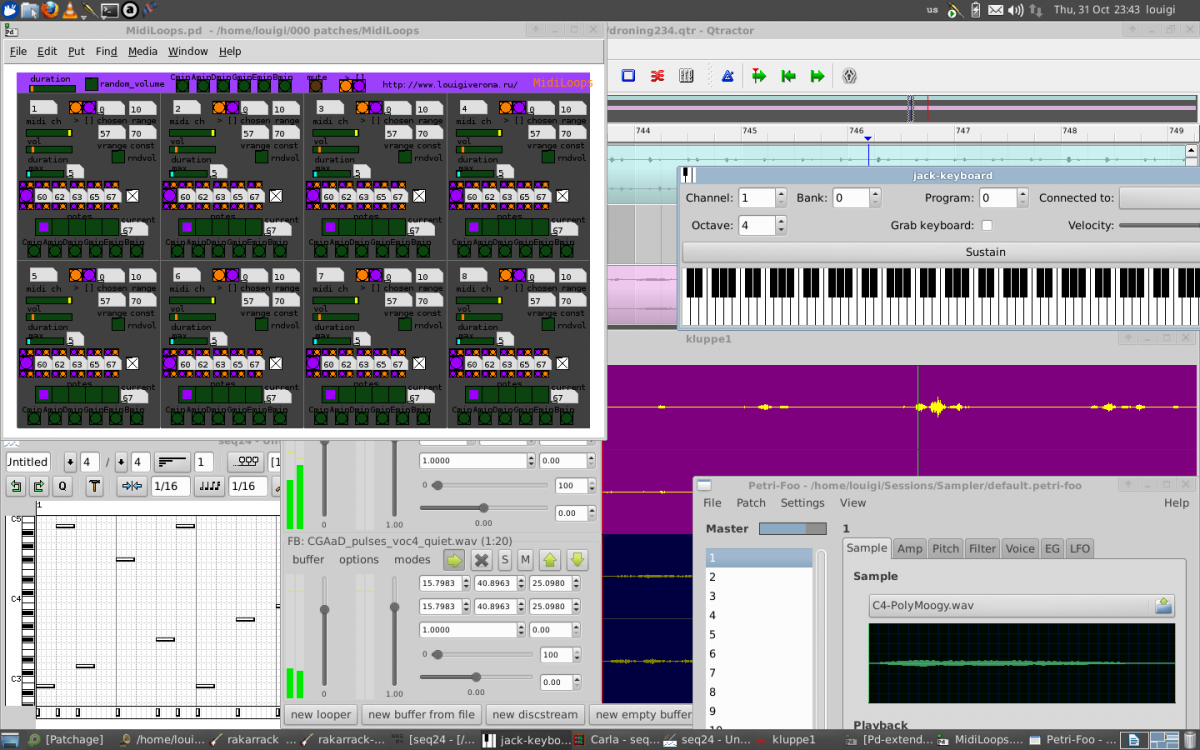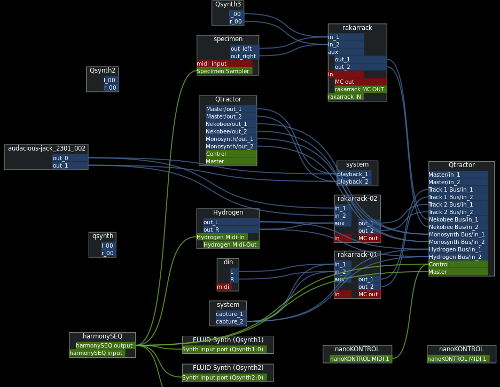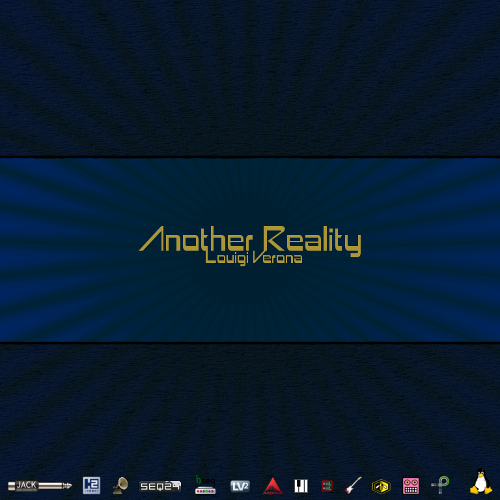Friday Interview #5: Louigi Verona
Hi, and welcome to the fifth edition of the Friday Interview! This week, we're joined by a well known musician in the Linux audio community. I'm very glad to introduce the fifth participant of new series, interviewee #5: Louigi Verona! Lets get started!
Introducing Louigi Verona
 Louigi Verona himself!
Louigi Verona himself!
Hi Louigi! Thanks a lot for doing this interview! What's your real name and where do you live? Tell us a bit about yourself!
Well, Louigi IS my real name, but it is not my birth-given name, if you know what I mean ;) My birth-given name is Kirill Alferov.
Currently I live in Moscow. The word “currently” is very important for me as I am keen on changing cities and countries. So far this is working out perfectly, I lived in NYC for quite some time as a kid and I moved to Moscow from the town I was born in, Rostov-on-Don, 8 years ago. I am now looking for opportunities to expand my life experience and get a chance to live somewhere else.
If you want to understand who I am, then it is all about what I do. To me it is vital to be doing personal creative projects. I am one of those people who gets depressed if stuck with an activity that he does not enjoy. I am a hobbyist by profession.
What's your musical background? What music are you into, and do you play any instruments?
I began to really be keen on music when I discovered electronic music. Over the years I came to realize that this is the only kind of music I really care about. I do understand and can occasionally enjoy non-electronic music, but this is not where my passion lies.
I completely broke off my ties to “pop music” or “music that is generally being played on the radio” when I discovered the demoscene and the subset of it called “tracking scene”. Artists like Elwood, Purple Motion, Vibrants and many others have shown me that music is way, way more interesting than endless songs about love with a standard verse chorus scheme. I have nothing against people who love pop music, but this is just not my thing. I am not able to connect with it. The only pop act that I really enjoy are Pet Shop Boys. A truly magical band, who are always delivering much more than just music.
I do play a recorder, tin whistles and an Irish low whistle a little bit. I also play percussion and keyboards. My skills are very basic, but they serve my needs.
What's your history with Linux, and with using Linux for audio?
I decided to use GNU/Linux by being convinced by Richard Stallman's writing. I became an FSF member and installed Ubuntu. I did try “completely free OS”, but eventally could not use it.
Having just met Richard Stallman in person at Web Summit in 2013, I have to tell you it brought back some memories. He is a great guy, a beautiful, honest person that I deeply respect.
Still, I do not follow all of his ideals. My socio-political position can be put very simply: I am against the initiation of physical force. The phrase makes it obvious where I stand, although it does not immediately demonstrate what actual implications of this philosophy are. Free software movement does not fully comply with that philosophy.
Nevertheless, my interest in Linux Audio always had a non-ideological part which is why I continue using it. It is great for ambient and the platform inspires me on many levels. I also enjoy using Linux Audio for live performances. While it is possible I will work with proprietary solutions in the future, it is highly unlikely I will ever stop using Linux Audio.
 A screenshot of Louigi Verona doing some work.
A screenshot of Louigi Verona doing some work.The “Another Reality” LP
You released a LP called “Another Reality” earlier this year. Great LP! For those who haven't heard it, can you tell us a bit about that LP? And, how has it been received?
This was an ambitious project, the goal of which was to produce the most sophisticated electronic album using standard Linux Audio software (as opposed to Pd and stuff) and also become famous. While there is still no article about Louigi Verona on Wikipedia, I do believe I've beautifully delivered on my first goal. At least, I personally know of no album that is so well produced, using a typical modular Linux Audio setup. By production here I do not mean musical quality which is quite subjective, but you know – the complexity of the thing. I also wanted to show off Nekobee, a TB303 emulator, which is a great plugin.
LP was received very warmly and I actually made a little bit of money on it from Bandcamp, as a number of people bought it. I am very thankful for that, it's a really great feeling.
Could you talk a bit about making “Another Reality”? How it came about, how long it took, and what software you used?
It took a little over a year, but each track individually took about 3-4 days. It was certainly not easy, as I had to manually synchronize things often and sometimes plan ahead. Remember – this is not an all-in-one app, one mistake and you have to re-record things again. And I did have to re-do some parts several times.
Most tracks except for one (can you tell which?) where done over a Nekobee solo. So what I would do was write a Nekobee sequence, play it out using a MIDI controller and record it. Then I would build the rest around it.
Software I used was Qtractor, Patchage, Petri-Foo, harmonySEQ, seq24, Rakarrack, CALF plugins, Nekobee DSSI, ZynAddSubFX, WhySynth. Some one-shot samples I specifically created in FL Studio though, as early on I had difficulties synthesizing sounds I wanted. But that's where “produced entirely with Linux Audio” becomes gray area anyway. Many sample libraries are created with all kinds of software, so I might have used something initially synthesized on Mac or even a hardware synthesizer :)
Dronings
You're also actively making dronings and posting online. Could you tell us a bit about how this project came to life, how you make the dronings, and what dronings actually are?
“droning” project is a whole era for me. It is a very personal life-long project. It is something that captures slower emotions as opposed to faster emotions, that melodic music is all about. Shades of emotions – this is what dronings are capable of capturing.
I have no idea whether “droning” is an art project. It is just a project. A listener is free to see dronings as he sees fit. I am not labeling them “art”. In fact, I am not labeling them at all. I call them recordings which is not saying much.
“droning” is something that I do for myself. That means I do not care if someone likes it or not and I was quite surprised people do. Don't get me wrong – I am happy people like them, very much! But if there was a device that would tell me with certainty that nobody will like it in the future or that it will never have more than 5 listeners or even 0 – I would still produce it.
I usually make “dronings” in real time, using Qtractor or Ardour as a recorder. I set things up and let them run. A number of dronings I do follow – for example, several pieces have me playing din. And if the tune lasts 45 minutes – that means I actually played it for 45 minutes. All dronings follow one simple compositional rule – they have to be periodic – meaning, they should not have break downs. If you hear one – than it is periodic. So each droning piece, if you “zoom out” enough is homogeneous.
 The routing displayed in a setup by Louigi Verona.
The routing displayed in a setup by Louigi Verona.
Interesting that you play the dronings live. Could explain the workflow a little bit more? Like, what plugins and synths do you usually use (except Din, which you already mentioned)?
It works a lot like Brian Eno's metaphor about a gardener. I plant a seed, so to speak. I have written a number of PureData tools to help me, I also use kluppe, the best looper for my needs, and then I can use anything else, from seq24 and Hydrogen to zyn and whatever. So very often I would record something into kluppe and set it playing, then I would either record a second loop or duplicate the first one and make sure they are of different lengths, for example. That would make them shift. I love loop shifting. Then I might add something else. And at some point a droning piece is complete. It is being generated on the fly, all the LFOs, loops, sequences are setup and now I just hit "record" and walk away.
This is not always the case, but this is what I would do often.
Do you have any personal favorites you want to share for interested readers?
This is a very multi-layered thing since "droning" is a complex project. A simple answer is that I easily get into the mood of 007, 010, 066, 142, 156, 202, 231 (find all of the dronings here). However, it is amazing how one day you just pick any tune to accompany your thoughts and it suddenly clicks. So this is the magic of the project for me, that it lets me explore all sorts of forms and atmospheres. Some days are such that they are best depicted by a particular droning. And so each tune has another value to it - that it might depict very accurately a state of mind you are in sometimes.
The future
What are you currently up to musically? Any future plans?
2013 has been very hectic. I've been out of a job and I am not able to be creative during hectic times. So “droning” project kind of slowed down this year, although it is not stopping and I've produced about 35 pieces this year.
I am also doing some 2d games and that has also slowed down my music. And Skeptic Society in Russia is also taking a lot of my time. And, of course, now my position as CTO. So I do not have any immediate plans.
Do you have any musical project you'd really like to do, but that you haven't had a chance to do yet due to various reasons?
Djing. I do have a dj album that I've made by mixing my own material and I even have a couple of tunes done using Giada – a Linux Audio tool. Djing is cool as it is much more popular than ambient and I can play gigs more often. What stops me is that I don't want to use Windows now and do dual-boots and stuff, so waiting while Giada matures, and also because I am afraid I will dive into it and it will eat up a couple of years of my life. I should do that some time, but not today!
Final questions
Do you feel like anything is lacking in Linux audio today, and if so, what?
Apart from ambient I have done and still want to do complex electronic music. That means having many plugins and samples interact and having to go back and change things. I really need a good all-in-one sequencer. Session management, in my view, is not a practical, efficient solution, unfortunately. LMMS is almost good enough but it does not support LV2 and DSSI which makes it hard to use any cool sounds and effects. Imagine electronic music without any effects! It also is not very good with JACK and that is like Windows without ASIO.
What's your favorite free and open source plugin currently?
I cannot name one, I am afraid. Currently I use Carla a lot and the many plugins it provides.
 Where the magic happens! Nice cushions.
Where the magic happens! Nice cushions.
Where can people find you, and your music? Do you have a Google+ page, Facebook page, or similar too?
Most of my work is presented on my website www.louigiverona.ru. I have structured it so that in encompasses almost all of my activity. My local activity - skeptic activism - is left out.
You can also follow me on YouTube (http://www.youtube.com/
I am present at Diaspora, but I do not use it much. I also tried creating a Facebook page dedicated to "droning" project, but I am not doing much with it either.
Finally, anything else you'd like to add to the interview?
I would like to say huge thanks to you for the interview, it is nice to put some of what one does into words. I also would like to say huge thanks to everyone who is interested in what I do. And specifically to all of the Linux Audio community - it is a warm feeling, being part of an international, very intelligent and talented group of people who think alike on many-many things and who are proud to be geeks, hackers and freedom activists!
Okay, thanks a lot again for partaking Louigi!
That was Louigi Verona, an electronic musician. Thanks to Louigi for participating, and thank you for reading!

 The cover of the Another Reality LP by Louigi Verona. Check it out at Louigi's
The cover of the Another Reality LP by Louigi Verona. Check it out at Louigi's